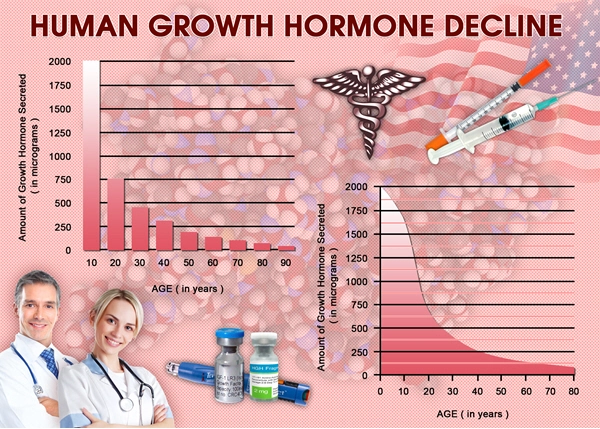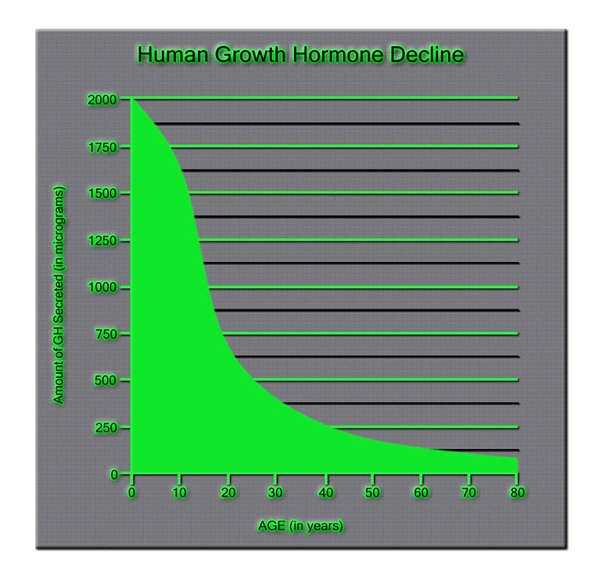Introduction to Hypopituitarism
Hypopituitarism is a rare medical condition characterized by the diminished production of one or more hormones by the pituitary gland. This small, pea-sized gland located at the base of the brain is crucial for regulating various bodily functions, including growth, metabolism, and reproductive processes. When the pituitary gland fails to produce sufficient hormones, it can lead to a cascade of health issues, one of which is a notable impact on muscle strength and physical performance.
The Role of Pituitary Hormones in Muscle Function
The pituitary gland secretes several hormones that are vital for maintaining muscle health. Growth hormone (GH), for instance, plays a pivotal role in muscle growth and repair. It stimulates the liver to produce insulin-like growth factor-1 (IGF-1), which is directly involved in promoting muscle cell proliferation and differentiation. Additionally, other hormones such as thyroid-stimulating hormone (TSH) and adrenocorticotropic hormone (ACTH) indirectly influence muscle strength by regulating metabolism and stress responses, respectively.
Impact of Hypopituitarism on Muscle Strength
In American males, hypopituitarism can manifest as a significant reduction in muscle strength and endurance. The deficiency in GH and IGF-1 can lead to muscle atrophy, where muscle mass decreases, resulting in weakened physical performance. Studies have shown that men with hypopituitarism often report difficulties in performing routine physical activities, such as climbing stairs or lifting objects, which can severely impact their quality of life.
Clinical Observations and Studies
Clinical research conducted in the United States has provided substantial evidence linking hypopituitarism to reduced muscle strength. A study published in the Journal of Clinical Endocrinology & Metabolism found that men with hypopituitarism exhibited significantly lower muscle strength compared to healthy controls. The study utilized dynamometry to measure grip strength and found a clear correlation between hormone deficiencies and diminished physical capabilities.
Management and Treatment Options
Managing hypopituitarism in American males involves hormone replacement therapy (HRT), which aims to restore hormone levels to normal. For muscle strength, GH replacement therapy is particularly crucial. Regular monitoring and adjustments of hormone dosages are essential to optimize muscle function and overall physical performance. In addition to HRT, a tailored exercise regimen can help mitigate muscle weakness. Resistance training, in particular, has been shown to be beneficial in improving muscle strength and mass in patients with hypopituitarism.
Lifestyle Considerations
Beyond medical interventions, lifestyle adjustments play a critical role in managing the impact of hypopituitarism on muscle strength. A balanced diet rich in protein is essential for supporting muscle health. American males with hypopituitarism should also consider integrating regular physical activity into their daily routines, focusing on exercises that promote muscle strength and endurance. Consulting with a nutritionist and a physical therapist can provide personalized guidance to enhance the effectiveness of these lifestyle changes.
Psychological Impact and Support
The physical limitations imposed by hypopituitarism can also lead to psychological challenges, such as depression and anxiety, which can further exacerbate muscle weakness. It is important for American males to seek psychological support to address these issues. Support groups and counseling can provide emotional relief and practical strategies for coping with the condition.
Conclusion
Hypopituitarism poses a significant challenge to muscle strength and physical performance in American males. Understanding the critical role of pituitary hormones in muscle function is essential for effective management of the condition. Through a combination of hormone replacement therapy, tailored exercise programs, and lifestyle adjustments, it is possible to mitigate the impact of hypopituitarism on muscle strength. Additionally, addressing the psychological aspects of the condition can enhance overall well-being and quality of life. As research continues to advance, new treatment options may emerge, offering hope for improved outcomes in the future.

- Unraveling the Link Between Hypopituitarism and Metabolic Syndrome in American Males [Last Updated On: March 9th, 2025] [Originally Added On: March 9th, 2025]
- Hypopituitarism in American Men: Impacts and Management Strategies [Last Updated On: March 11th, 2025] [Originally Added On: March 11th, 2025]
- Unveiling the Cardiovascular Risks Associated with Hypopituitarism in American Males [Last Updated On: March 12th, 2025] [Originally Added On: March 12th, 2025]
- Unveiling the Cardiovascular Implications of Hypopituitarism in American Males [Last Updated On: March 16th, 2025] [Originally Added On: March 16th, 2025]
- Unraveling the Connection: Hypopituitarism and Uterine Fibroids in American Males [Last Updated On: March 16th, 2025] [Originally Added On: March 16th, 2025]
- Exploring Hypopituitarism's Impact on Vaginal Health and the Female Reproductive System [Last Updated On: March 16th, 2025] [Originally Added On: March 16th, 2025]
- Unraveling the Hormonal Link Between Hypopituitarism and Breast Cancer in American Males [Last Updated On: March 16th, 2025] [Originally Added On: March 16th, 2025]
- Hypopituitarism in American Males: Cognitive Impacts and Management Strategies [Last Updated On: March 17th, 2025] [Originally Added On: March 17th, 2025]
- Surgery for Hypopituitarism and Pituitary Tumors in American Males: Benefits and Risks [Last Updated On: March 18th, 2025] [Originally Added On: March 18th, 2025]
- Hypopituitarism's Impact on Skin Health in American Males: Symptoms, Diagnosis, and Management [Last Updated On: March 18th, 2025] [Originally Added On: March 18th, 2025]
- Hypopituitarism in American Males: Cancer Risks and Management Strategies [Last Updated On: March 19th, 2025] [Originally Added On: March 19th, 2025]
- Hypopituitarism in American Males: Managing Depression and Anxiety [Last Updated On: March 19th, 2025] [Originally Added On: March 19th, 2025]
- Hypopituitarism in American Men: Hormonal Imbalance and Sleep Disturbance Effects [Last Updated On: March 20th, 2025] [Originally Added On: March 20th, 2025]
- Hypopituitarism and Obesity in American Males: Diagnosis, Management, and Hormonal Links [Last Updated On: March 20th, 2025] [Originally Added On: March 20th, 2025]
- Hypopituitarism and Autoimmune Disorders: Implications for American Males [Last Updated On: March 20th, 2025] [Originally Added On: March 20th, 2025]
- Multidisciplinary Care Essential for Managing Hypopituitarism in American Males [Last Updated On: March 21st, 2025] [Originally Added On: March 21st, 2025]
- Hypopituitarism in American Males: Impact on Eye Health and Visual Impairments [Last Updated On: March 21st, 2025] [Originally Added On: March 21st, 2025]
- Hypopituitarism in American Males: Impact on Kidney Function and Management Strategies [Last Updated On: March 21st, 2025] [Originally Added On: March 21st, 2025]
- Hypopituitarism in Aging American Males: Symptoms, Impact, and Management Strategies [Last Updated On: March 21st, 2025] [Originally Added On: March 21st, 2025]
- Hypopituitarism and Allergies: Exploring Hormonal Impacts on Immune Response in American Males [Last Updated On: March 22nd, 2025] [Originally Added On: March 22nd, 2025]
- Hypopituitarism's Impact on Gastrointestinal Health in American Males [Last Updated On: March 22nd, 2025] [Originally Added On: March 22nd, 2025]
- Hypopituitarism and Anemia: Erythropoietin Deficiency's Role in American Males [Last Updated On: March 22nd, 2025] [Originally Added On: March 22nd, 2025]
- Hypopituitarism and Hair Loss: Impacts and Treatments for American Males [Last Updated On: March 23rd, 2025] [Originally Added On: March 23rd, 2025]
- Hypopituitarism's Impact on Asthma in American Males: Hormonal Links and Management [Last Updated On: March 23rd, 2025] [Originally Added On: March 23rd, 2025]
- Hypopituitarism and Hearing Loss: Exploring the Link in American Males [Last Updated On: March 23rd, 2025] [Originally Added On: March 23rd, 2025]
- Exploring the Link Between Hypopituitarism and MS in American Males: Clinical Insights [Last Updated On: March 23rd, 2025] [Originally Added On: March 23rd, 2025]
- Hypopituitarism and Dyslipidemia: Hormonal Impacts on Lipid Profiles in American Males [Last Updated On: March 23rd, 2025] [Originally Added On: March 23rd, 2025]
- Hypopituitarism's Link to Alzheimer's in American Males: Hormonal Imbalances and Cognitive Decline [Last Updated On: March 24th, 2025] [Originally Added On: March 24th, 2025]
- Hypopituitarism and Migraines in American Males: Hormonal Fluctuations and Management Strategies [Last Updated On: March 24th, 2025] [Originally Added On: March 24th, 2025]
- Hypopituitarism and Hypertension: Impacts and Management in American Males [Last Updated On: March 24th, 2025] [Originally Added On: March 24th, 2025]
- Hypopituitarism in American Males: Hormonal Impact on Joint Health and Management Strategies [Last Updated On: March 24th, 2025] [Originally Added On: March 24th, 2025]
- Hypopituitarism's Impact on Liver Health in American Males: Mechanisms and Management [Last Updated On: March 24th, 2025] [Originally Added On: March 24th, 2025]
- Hypopituitarism and Stroke Risk in American Males: Hormonal Monitoring and Prevention Strategies [Last Updated On: March 24th, 2025] [Originally Added On: March 24th, 2025]
- Hypopituitarism's Impact on Osteoarthritis in American Males: A Comprehensive Overview [Last Updated On: March 24th, 2025] [Originally Added On: March 24th, 2025]
- Hypopituitarism's Impact on Immune Function in American Males: Diagnosis and Management [Last Updated On: March 24th, 2025] [Originally Added On: March 24th, 2025]
- Hypopituitarism's Impact on Pancreatitis: Risks and Management for American Males [Last Updated On: March 24th, 2025] [Originally Added On: March 24th, 2025]
- Hypopituitarism and Seizures in American Males: Neurological Links and Management [Last Updated On: March 24th, 2025] [Originally Added On: March 24th, 2025]
- Hypopituitarism and Diabetes: Impact on Glucose Metabolism in American Males [Last Updated On: March 25th, 2025] [Originally Added On: March 25th, 2025]
- Hypopituitarism and Chronic Fatigue Syndrome: Overlap and Impact on American Men [Last Updated On: March 25th, 2025] [Originally Added On: March 25th, 2025]
- Hypopituitarism in American Males: Cardiovascular Risks and Management Strategies [Last Updated On: March 25th, 2025] [Originally Added On: March 25th, 2025]
- Autoimmune Link Between Hypopituitarism and RA: Implications for American Males [Last Updated On: March 25th, 2025] [Originally Added On: March 25th, 2025]
- Hypopituitarism and Fibromyalgia: Overlapping Symptoms and Management in American Males [Last Updated On: March 26th, 2025] [Originally Added On: March 26th, 2025]
- Hypopituitarism and Pituitary Cancer: Symptoms, Detection, and Management in American Males [Last Updated On: March 26th, 2025] [Originally Added On: March 26th, 2025]
- Hypopituitarism and Gallbladder Disease: Emerging Links and Implications for American Males [Last Updated On: March 26th, 2025] [Originally Added On: March 26th, 2025]
- Hypopituitarism and Breast Cancer in American Males: Hormonal Links and Clinical Insights [Last Updated On: March 26th, 2025] [Originally Added On: March 26th, 2025]
- Hypopituitarism and Sjögren's Syndrome: Effects on Exocrine Glands in American Males [Last Updated On: March 27th, 2025] [Originally Added On: March 27th, 2025]
- Hypopituitarism's Role in Parkinson's Disease Progression and Management [Last Updated On: March 27th, 2025] [Originally Added On: March 27th, 2025]
- Exploring Hypopituitarism and Lupus Connection in American Males: Clinical Insights [Last Updated On: March 27th, 2025] [Originally Added On: March 27th, 2025]
- Hypopituitarism in American Males: Impacts on Kidney Health and Management Strategies [Last Updated On: March 28th, 2025] [Originally Added On: March 28th, 2025]
- Hypopituitarism and Gout: Uric Acid Link in American Males [Last Updated On: March 28th, 2025] [Originally Added On: March 28th, 2025]
- Autoimmune Links Between Hypopituitarism and Celiac Disease in American Males [Last Updated On: March 28th, 2025] [Originally Added On: March 28th, 2025]
- Hypopituitarism and Liver Cirrhosis: Impact on Hepatic Function in American Males [Last Updated On: March 29th, 2025] [Originally Added On: March 29th, 2025]
- Hypopituitarism and IBD Link in American Males: Gastrointestinal and Hormonal Interplay [Last Updated On: March 29th, 2025] [Originally Added On: March 29th, 2025]
- Hypopituitarism and Adrenal Cancer: Endocrine System Interplay and Management in American Males [Last Updated On: March 29th, 2025] [Originally Added On: March 29th, 2025]
- Hypopituitarism and Ovarian Cancer: Exploring Gynecological Links in American Males [Last Updated On: March 30th, 2025] [Originally Added On: March 30th, 2025]
- Hypopituitarism's Impact on Thyroid Cancer Risk in American Males [Last Updated On: March 30th, 2025] [Originally Added On: March 30th, 2025]
- Hypopituitarism's Impact on Prostate Cancer Risk and Management in American Males [Last Updated On: March 31st, 2025] [Originally Added On: March 31st, 2025]
- Hypopituitarism and Testicular Cancer: Impacts on Male Fertility and Preservation Strategies [Last Updated On: March 31st, 2025] [Originally Added On: March 31st, 2025]
- Hormonal Links Between Hypopituitarism and Endometriosis in American Males Explored [Last Updated On: April 1st, 2025] [Originally Added On: April 1st, 2025]
- Hypopituitarism and Uterine Fibroids: Exploring Gynecological Links in American Males [Last Updated On: April 1st, 2025] [Originally Added On: April 1st, 2025]
- Hypopituitarism and PCOS: Impacts, Diagnosis, and Management in Women's Health [Last Updated On: April 2nd, 2025] [Originally Added On: April 2nd, 2025]
- Hypopituitarism's Impact on Penile Health in American Males: Diagnosis and Management [Last Updated On: April 6th, 2025] [Originally Added On: April 6th, 2025]
- Hypopituitarism's Impact on Male Vaginal Health: Hormonal Imbalances and Comprehensive Care [Last Updated On: April 7th, 2025] [Originally Added On: April 7th, 2025]
- Hypopituitarism and Premature Ejaculation: Exploring Links and Treatment in American Males [Last Updated On: April 8th, 2025] [Originally Added On: April 8th, 2025]
- Hypopituitarism's Impact on Male Fertility: Diagnosis, Management, and Treatment for American Men [Last Updated On: April 10th, 2025] [Originally Added On: April 10th, 2025]
- Hypopituitarism and Cervical Cancer: The Crucial Role of Hormonal Monitoring [Last Updated On: April 10th, 2025] [Originally Added On: April 10th, 2025]
- Hypopituitarism and Erectile Dysfunction: Hormonal Links and Treatment Strategies [Last Updated On: April 10th, 2025] [Originally Added On: April 10th, 2025]
- Hypopituitarism and Preeclampsia: The Critical Need for Hormonal Monitoring in Pregnancy [Last Updated On: April 10th, 2025] [Originally Added On: April 10th, 2025]
- Hypopituitarism and Postpartum Depression: Impacts on Mental Health in American Males [Last Updated On: April 12th, 2025] [Originally Added On: April 12th, 2025]
- Hypopituitarism in American Males: Hormonal Impacts on Fertility and Miscarriage Risk [Last Updated On: April 12th, 2025] [Originally Added On: April 12th, 2025]
- Exploring the Metabolic Link Between Hypopituitarism and Gestational Diabetes in American Males [Last Updated On: April 13th, 2025] [Originally Added On: April 13th, 2025]
- Hypopituitarism and Ectopic Pregnancy: Impacts on Women and Role of American Males [Last Updated On: April 13th, 2025] [Originally Added On: April 13th, 2025]
- Hypopituitarism and Acne in American Males: Hormonal Links and Management Strategies [Last Updated On: April 15th, 2025] [Originally Added On: April 15th, 2025]
- Hypopituitarism's Impact on Menopause: Diagnosis, Management, and Hormonal Balance [Last Updated On: April 15th, 2025] [Originally Added On: April 15th, 2025]
- Hypopituitarism's Impact on Lactation in American Males: Challenges and Management [Last Updated On: April 15th, 2025] [Originally Added On: April 15th, 2025]
- Hypopituitarism and Alopecia: Hormonal Imbalances and Hair Loss in American Males [Last Updated On: April 16th, 2025] [Originally Added On: April 16th, 2025]
- Hypopituitarism and Andropause: Impacts, Diagnosis, and Management in Aging Men [Last Updated On: April 18th, 2025] [Originally Added On: April 18th, 2025]
- Hypopituitarism and Vision Loss in American Males: Mechanisms, Symptoms, and Management [Last Updated On: April 18th, 2025] [Originally Added On: April 18th, 2025]
- Hormonal Link Between Hypopituitarism and Hirsutism in American Males: Impacts and Management [Last Updated On: April 18th, 2025] [Originally Added On: April 18th, 2025]
- Hypopituitarism and Vestibular Disorders: Exploring Hormonal Impacts on Balance in American Males [Last Updated On: April 19th, 2025] [Originally Added On: April 19th, 2025]



List of USA state clinics - click a flag below for blood testing clinics.
Word Count: 599



















































